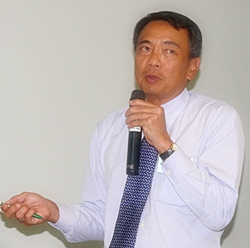The very active Automotive Focus Group (AFG) on the Eastern Seaboard which is now over 100 members, held their monthly meeting at the Shibuya Japanese restaurant on 2nd floor of the ESIE Plaza 1, with the event sponsored by Hemaraj Land & Development PCL.
With the rapid growth of the automotive industry in Thailand, and on the Eastern Seaboard in particular, the AFG has seen that there will be a need for trained personnel. A shortage in the workforce, especially the technically qualified, needs to be addressed and Hemaraj and AMCHAM are trying hard to push many ideas towards government. One of the concepts is a Technical College within the surrounding industrial estate, with private sector participation.
 Preeprem Malasitt.
Preeprem Malasitt.
The AFG group was addressed by Preeprem Malasitt, the Special Project Director at Hemaraj involving labor relations, training and development, with government and private bodies.
Preeprem began by outlining the root causes starting with the mismanagement of the education system where sections in need are glossed over in favor of bachelor degree graduates. However, industry only needs 46,000 of these, while the education system pumps out 130,000.
A lack of career guidance in school is another root cause, and with 118,000 new employees needed in the Auto industry by 2015, this is a severe shortfall.
Another factor is the fact that entry level wages do not reflect training, so there is little incentive to join industry, rather than working in the agriculture arena.
Preeprem did offer some short and medium term remedies including, for large companies, using sub-contractors and agencies, but small businesses could join a vocational program with a local technical school. However, he did point out that only eight of the 100+ companies in their industrial estate availed themselves of this opportunity.
He also suggested that to improve industrial relations, employers should look to becoming involved with up-country communities to create a feeling of ‘belonging’ between the workers and the company. This was a successful ploy by Japanese companies, who now claimed zero turnover.
Other HR projects should include setting up cooperative loans (like Credit Unions) and adjust entry level wages to reward technical competence.
For the long term remedies, Preeprem suggested the government Skill Development Centers could be better used to encompass training in the technical skills, but this was hampered by a lack of skilled teachers.
Finally, he outlined the proposal to build a Hemaraj Eastern Seaboard Technical College, which would be funded jointly by large corporations and Hemaraj itself. This would be a boarding college which would implant discipline and teamwork in its graduates. They would expect student numbers of 350 initially, enlarging to 1,050 by year 2015. Teaching staff would begin at 15 and swell to 60 by 2015.
In the discussions afterwards, it was felt by many that there were some very good points that had been raised, but could the costs be justified. With no apprenticeship scheme in Thailand, would a privately run technical college be a viable program. Everyone agreed with the concept but the suggested 30 million baht for six to eight companies to get the technical college scheme up and running was a very heavy investment.
There was also quite a groundswell of opinion that the government should be more involved, but Preeprem countered that by intimating that government involvement would end up as public service government agency meddling! And could leave the project open to corrupt practices. Preeprem finished his lecture with the quotation, “Helping the diligent and committed poor and give them opportunities.”
Another very thought-provoking evening for the AFG members, which continued on for some time over some tasty Japanese food from the Shibuya Japanese restaurant and Belgian beer and South African wine. If you are interested in joining the AFG, contact the secretariat at [email protected]




